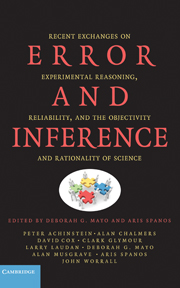 Error and Inference
Error and Inference Published online by Cambridge University Press: 29 January 2010
Introduction
Deborah Mayo's “error-statistical” account of science and its mode of progress is an attempt to codify and capitalise on the “new experimentalist” approach to science that has made its appearance in the past few decades as an alternative to “theory-dominated” accounts of science. Rather than understanding scientific progress in terms of the replacement of one large-scale theory by another in the light of experiments designed to test them, new experimentalists view progress in terms of the accumulation of experimental discoveries and capabilities established independently of high-level theory. The new experimentalists aspire to an account of science and its mode of progress that evades problems associated with the theory dependence of observation, the underdetermination of theories by evidence, the Duhem problem and incommensurability that have beset the theory-dominant approach. Here is how Mayo (this volume, p. 28) herself characterizes the situation:
Learning from evidence, in this experimentalist philosophy, depends not on appraising large-scale theories but on local experimental tasks of estimating backgrounds, modeling data, distinguishing experimental effects, and discriminating signals from noise. The growth of knowledge has not to do with replacing or confirming or probabilifying or ‘rationally accepting’ large-scale theories, but with testing specific hypotheses in such a way that there is a good chance of learning something – whatever theory it winds up as part of.
Central to Mayo's version of the new experimentalism is her notion of a severe test.
To save this book to your Kindle, first ensure [email protected] is added to your Approved Personal Document E-mail List under your Personal Document Settings on the Manage Your Content and Devices page of your Amazon account. Then enter the ‘name’ part of your Kindle email address below. Find out more about saving to your Kindle.
Note you can select to save to either the @free.kindle.com or @kindle.com variations. ‘@free.kindle.com’ emails are free but can only be saved to your device when it is connected to wi-fi. ‘@kindle.com’ emails can be delivered even when you are not connected to wi-fi, but note that service fees apply.
Find out more about the Kindle Personal Document Service.
To save content items to your account, please confirm that you agree to abide by our usage policies. If this is the first time you use this feature, you will be asked to authorise Cambridge Core to connect with your account. Find out more about saving content to Dropbox.
To save content items to your account, please confirm that you agree to abide by our usage policies. If this is the first time you use this feature, you will be asked to authorise Cambridge Core to connect with your account. Find out more about saving content to Google Drive.